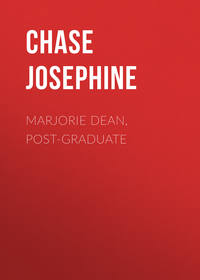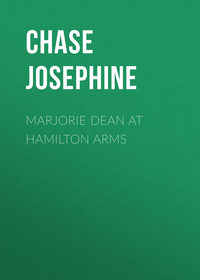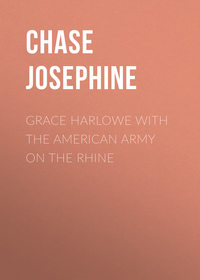 полная версия
полная версияMarjorie Dean, College Freshman
“Whew!” whistled Jerry. “Things have certainly been happening at the nursery. You are simply splendid, Ronny. You are always thinking of some way to help people. Just wait until I take my presidential chair as chief boss of the Lookouts. I will publish your noble deed abroad.”
“If you don’t, I will,” emphasized Marjorie. “There isn’t much we can say to tell you how grateful we are to you, Ronny.”
“Don’t say anything.” A bright flush had risen to Ronny’s cheeks. “I knew the girls would be away. I thought you would be quite apt to worry about the nursery and spend a lot of time there for conscientious reasons. I was thinking more of you I presume than the nursery.”
“It was a great relief,” Marjorie made honest response. “Besides, it helped two splendid girls along.”
“Then let it rest at that. Never mind about publishing my, thus-called, noble deed at a club meeting. I prefer not to let my right hand know what my left happens to be doing,” declared Ronny. “What we must think of is getting the new Lookout chapter started. We ought to have it organized by the fifth of September so it will stand on its own feet. After the fifth you know what a rush there will be. We shall be going to farewell teas, luncheons and parties. At least I hope so. Last year I had very good times. This fall things have changed. Now I’d love to dance and be happy with the crowd of Sanford boys and girls who were so friendly with me when I was a senior. Marjorie said today, Jerry, that I was like a butterfly that had won free of the chrysalis. The butterfly is anxious to spread its wings for a few last delightful flights around Sanford.”
CHAPTER V. – THE BREAKING UP OF THE OLD GUARD
“This saying good-bye business is growing harrowing,” complained Jerry one hazy September morning. She stood with her chums on the station platform, waving farewell to Florence Johnston, who was leaving for Markham College, a western university. “This is the third time for us at the station this week. Monday it was Mignon, Daisy Griggs and Gertrude Aldine, all bound for Smith. Wednesday it was Esther, Rita, Susan and Irma. I am not over the blues yet on account of losing Susan and Irma. I wish they had chosen Hamilton instead of Wellesley.”
The seven Lookouts still left in Sanford were strolling soberly across the green station yard to the drive behind the station where Jerry had parked the Macys’ ample touring car. She had elected to drive it that morning because of its capacity.
“Harriet and I are going to be the lonesome ones before long,” remarked Constance Stevens, her blue eyes roving somberly from friend to friend. The private conservatory Constance and Harriet were to enter did not open until the latter part of October. This would make them the last to leave Sanford. “It is going to seem awfully queer for us without you girls, isn’t it, Harriet?”
“Yes.” Harriet was looking unduly solemn. “Still we knew long ago that it would have to come sometime; this breaking up of the old crowd.”
“We must try to be together a lot during vacations. Most of us will be home for Thanksgiving, and all of us for Christmas and Easter,” was Marjorie’s philosophical consolation.
“Well, we’re going to have one last good old frolic at Connie’s tonight, anyway,” was Jerry’s cheering reminder.
“I can’t come tonight, Constance,” Lucy Warner announced in her brusque fashion. “I must give these last few evenings to Mother. Besides, I don’t feel at home in your crowd when the boys are there. I don’t care much about young men. I never know what to say to them,” she added, coloring slightly.
“I understand the way you feel about it,” Constance returned with a smile. She had once been visited by the same discomfiture in the first days of her friendship with Marjorie. The others were laughing at Lucy’s blunt avowal. “I’ll forgive you for turning down my party. You know we would love to have you with us, but if you were not at ease it would be hard for you.”
“Yes, it would. Much obliged.” Lucy’s terse agreement provoked fresh laughter.
Ronny had promised Marjorie to take Lucy in hand and try to overcome her objections to entering Hamilton College that fall. Three times she besieged Lucy before success came. On the third interview, Ronny learned the real difficulty. Very solemnly Lucy told her the story of the Observer and her subsequent ingratitude toward Marjorie. Ronny had felt righteous anger flame within her as she had listened. She had almost wished she had never offered a scholarship in behalf of such an ingrate. Her brain clearing of its hasty resentment, she had been visited by the same divine pity for poor, embittered Lucy that had swayed Marjorie on the occasion of the Observer confession.
Very cleverly Ronny had seized upon the confession to move Lucy from her torturing resolve. She argued that, as it was Marjorie’s wish to see Lucy enter college with herself and friends, she therefore owed it to Marjorie as an amend honorable. Her point gained, Ronny managed also to persuade Lucy to accept financial help from her if necessary. This she reluctantly promised to do, provided she were allowed to repay her young benefactor when in position to do so. Thus Lucy became the fifth Lookout, Hamilton-bound, greatly to Marjorie’s delight.
“What you ought to do is practice hanging around with our gang until you are not the least bit scared at Hal or Laurie or the rest of our boys,” Jerry advised. “They aren’t ogres and hob-goblins. There is really nothing very awe-inspiring about a young man. If you had lived in the same house with Hal as long as I have, you would know how to talk to him all right enough.”
“I haven’t; therefore I don’t,” Lucy returned concisely, but with an open good nature which showed how greatly she had emerged from her shell since becoming a Lookout.
“There goes Flora Frisbee,” suddenly called out Muriel, as she exchanged a gay salute with a girl who had just passed in an automobile.
“Where?” inquired three or four voices. A particularly well liked senior, Flora had acquired a further high standing with the Lookouts as the president of the new chapter.
“Too late. She is out of sight. I just happened to see her as she flashed by in her brother’s roadster. I think she is going to make a dandy president. Don’t you?”
“The very best.” It was Jerry who answered. “I am certainly glad the new chapter is going so nicely. They have settled down to that nursery detail like veterans.”
“I was so proud of them that day at Muriel’s when we organized the new chapter,” praised Ronny.
“They did as well as we when we began,” commented Muriel. “If only they keep it up. We picked the best of the seniors.”
Following a meeting at Jerry’s home, at which the Lookouts had selected the candidates for the new chapter, a second meeting had been held at Muriel’s. Each charter Lookout had gallantly escorted her choice there. Fifteen gratified seniors had listened to the rules of the club and promised to live up to them. They had pledged themselves to faithfully carry on the work of their absent elder sisters at the day nursery and be always ready to help those in need of friendly aid. They had then capably taken up the pleasant task of electing their officers and performed it with business-like snap.
Soon after their organization they had accompanied the charter members to the nursery and spent a merry afternoon getting acquainted with the little ones. From then on they had begun their regular duty tours accompanied, at first, by one of the old guard on each tour. Soon accustoming themselves to the routine, their elder sisters breathed more freely and set about attending to their own manifold affairs.
“We hope we picked fifteen winners. If we didn’t we’ll soon know it with a bang. That nursery will run on wheels, minus one trouble maker. Just one will throw the whole concern up in the air. While I don’t doubt our new sisters, let time do its perfect work. So says Jeremiah. She says further, get into the car all of you. I’m going to take you straight home. I’m going to a party tonight and I have no time to waste standing talking on the corner. There will be young men at that party!” Jerry dropped her voice to a hoarse melodramatic whisper and stared wildly at Lucy, chin thrust forward.
“I can’t help that. I – I should worry. I’m no buttinski.” Lucy’s unexpected use of slang raised a gale of laughter.
“I am afraid you learned that from me. You are growing up precautious. You need a guardian.” With this Jerry bundled Lucy into the tonneau of the machine and turned her over to Marjorie and Muriel who had already climbed into the car.
In her usual energetic fashion she proceeded to drive her chums to their various homes, where she dropped them with scant ceremony. “I know you are all in a hurry to get home,” she sweetly assured them. “If you aren’t, I am. It’s all one. Good-bye. Shall I see you this evening? You had better believe it.”
The informal gathering at Gray Gables would comprise the remaining Lookouts of the charter and six or seven of the Sanford boys whom Constance knew best and who were intimate friends of Laurie Armitage’s. Marjorie, in particular, was happy in the invitation. She thought it so beautiful that Connie, who had known the bitterest want, should be the hostess at their last frolic, commemorative of their high school days.
As she dressed for the party that evening, her thoughts traveled back to the eventful night of the freshman dance when Constance had worn the blue gown and made her entrance into the social side of high school under difficulties. At that time she had been a very humble person. Now she was perhaps the most admired young woman in Sanford on account of her beautiful voice. Things had changed a good deal in four years for Connie, Marjorie reflected. She took a special pride in her appearance that night, not only in honor of Constance, but because she owed it to herself to look her best on that last happy evening with her friends.
When Veronica entered Marjorie’s house, attired in her white lace Commencement Day frock, a pale blue evening cape composed of many ruffles of chiffon hanging over one arm, she found a pensive little figure in white occupying the pink and white window seat. Marjorie was also wearing her graduation gown and looking utterly lovely in it.
“I’m mooning,” she announced, turning her curly head as Ronny entered, her eyes very bright. “It’s a perfect night, Ronny. Almost warm enough to go without a wrap. Hal will be here for us. I forgot to tell you. He called me on the ’phone yesterday to ask me if he might take us over in his car.”
Veronica smiled slightly at this frank announcement. It contained not a trace of self-consciousness. Long ago Ronny had glimpsed Hal Macy’s mind regarding Marjorie. She knew the latter to be the likable young man’s ideal and had seen boyish worship of Marjorie more than once in his clear blue eyes. She also understood that Marjorie was wholly fancy free. While she valued Hal as a near friend, any awakening to a deeper sentiment on her part belonged to a far distant day.
CHAPTER VI. – THE BOWKNOT OF AFFECTION
That evening as Hal assisted the two girls into the tonneau of the limousine, he was of the romantic opinion that he had merely persuaded a couple of stray moonbeams to ride with him. The light of the fair, increasing moon endowed the duo with a peculiar ethereal beauty which gave him a feeling of reverence. Girls were mostly like flowers was his boyish comparison. The most beautiful flower of them all was Marjorie. Someday he would dare tell her so, but not for a long time.
Arrived at Gray Gables Hal had no further opportunity to “moon.” The rest of the company had arrived and were impatiently awaiting them. The limousine had hardly come to a stop on the drive when out of the house they trooped, shouting the Sanford and Weston High School yells by way of welcome. Danny Seabrooke and the Crane then broke into the “Stars and Stripes” on mouth organs. Miles Burton rattled out a lively accompaniment on little Charlie Stevens’ toy drum.
“I had no idea I was so popular.” Hal bowed his thanks to the noisy musicians.
“You are not,” the Crane hastened to inform him. “That choice selection we just rendered was in honor of the girls. Don’t credit yourself with everything. It’s horribly conceited.”
“I’m glad you named it as a ‘selection,’” Hal made scathing retort.
“What, may I ask, would you name it?” queried Danny with a dangerous affability.
“Making night hideous, or, a disgraceful racket, or, the last convulsions of a would-be jazz band. Any little appellation like that would be strictly appropriate.” Hal beamed ironically on the three. “Nice little drummer boy you have there.”
Supposedly offended, Danny could not repress a loud snicker at this fling. Miles Burton stood six feet, minus shoes. With Charlie’s toy drum strung round his neck on a narrow blue ribbon, he was distinctly mirth-inspiring.
“Throw any more remarks like that about me and you’ll find out my real disposition,” warned Miles in a deep bass growl.
“Come ladies; let us hasten on before trouble overtakes us – me, I mean. Back, varlets. Grab your instruments of torture and begone.” Hal grandly motioned the objectionable varlets out of the way.
“That’s what I say,” called Jerry from the top step. “For once I agree with Hal. Let the girls come up on the porch, can’t you? You four sillies can stay outside and rave. Notice how well Laurie and Harry are behaving. Try to be a little like them, if you can.”
“You can’t know them as I do,” rumbled Miles.
“No; I guess not,” emphasized Hal. “Well, I’d rather be called a silly than a varlet.”
“That will do from all of you.” Jerry ran down the steps and with a few energetic waves of the arms drove the masculine half of the guests up onto the brightly-lighted veranda. There the entire company lingered to talk, presently strolling into the long old-fashioned drawing room which Constance used for dancing purposes when entertaining her friends.
“Be happy and make yourselves at home,” she said in her pretty, graceful fashion. “Father and Uncle John will soon be here to play for us. They are helping Mr. Beaver, the leader of the Sanford orchestra, organize some of the Sanford working boys into an orchestra. It’s a fine idea. I think Father and Uncle John will help him all they can whenever they are at home.”
Marjorie cast a quick, inquiring look toward Constance. Her eyes luminous with affection, she asked: “Has it come at last, Connie?”
“Yes, Marjorie,” Constance answered, in a proud, happy tone. “I would like you to know,” she continued, turning to the others, “that Uncle John is to be a first violin in Father’s symphony orchestra. You can understand just how glad we feel about it.”
Connie’s news met with an echoing shout. All present cherished the warmest regard for gentle Uncle John, who had ever been so willing to play for them. Far removed from poverty, he had gradually regained the lost faculty of memory and could now be relied upon for symphony work.
“Oh, just wait until he gets home!” promised Hal. “Won’t he get a reception, though?”
“Surest thing in the world!” Laurie’s dark blue eyes were darker from emotion. Laurie had known for a very long time that, if Constance’s adopted family were not his own, some future day, it would not be his fault.
“That explains why we haven’t seen Charlie,” smiled Marjorie. “He is actually helping, at last, to organize a big band. I meant to ask for him. There was so much sarcasm being hurled back and forth, my voice would have been lost in the uproar,” she slyly added.
“He took his violin and music. The music was a lot of old stray song sheets. He will play them and put everyone out, if he has a chance,” Constance predicted with an infectious little giggle.
The entrance of Miss Allison into the drawing room brought the young folks to their feet. Her fondness for youth made her a welcome addition at their parties. She particularly enjoyed Danny Seabrooke’s antics and the sham penalties they invariably brought on him.
“You young gentlemen will soon be leaving for college as well as our girls,” she remarked to Hal. “I am glad Laurie has decided to go through college before making music his profession. He really needs the college training. Constance, on the contrary, will do as well to begin her training for grand opera at once. She must study Italian and Spanish. That, with her vocal practice, will keep her fully occupied. How I shall miss my boys and girls! They have been life to me.” Miss Allison’s delicate features saddened unconsciously.
A muffled sob, too realistic to be genuine, rent the air at her right. Her sad expression vanished as her eyes lighted upon the mourner. Slumped into the depths of a big velvet chair, Danny was struggling visibly with his sorrowful emotions.
“To see us all here tonight, who would dream of the parting to come so soon-n; s-o s-o-o-o-on-n!” he wailed, covering his freckled, grief-stricken countenance with both hands. No one arising to assuage his sorrow, his gurgles and sobs grew louder.
“Won’t some one please choke off that bellow?” Laurie viewed the perpetrator of the melancholy sounds with a cold, unrelenting eye.
“De-lighted.” Hal rose from a seat on the davenport beside Marjorie and advanced with threatening deliberation upon Danny.
“You needn’t mind. I am getting used to the idea of parting now.” The “bellow” ceased like magic. Danny spoke in a small, sad voice that might have belonged to a five-year-old girl. “Soon I shall be able to contemplate it without a single tear. I could part from you,” he suddenly recovered his own voice, “or that ruffian of an Armitage, and smile; yes, sir; actually smile. I’d rather part at any time, and from anybody than to be murderously ‘choked off’ by you two bullies.”
Danny hastily arose, after this defiant declaration, and retreated to the lower end of the room. Crowding himself into a small rocking chair belonging to Charlie, he rocked and smirked at Hal, who had followed him to the chair and now stood over him.
“Move back a trifle, Mr. Macy. I refuse to be responsible for other people’s shins. I have all I can do to take care of my own. If I were to kick you, accidentally, I should be so sorry!”
“Oh, undoubtedly! Wouldn’t you, though?” Bending, with one swift movement of the arm, Hal upset the rocker and its grinning occupant. “Now will you be good?” he inquired sarcastically. Leaving the struggling wag to right himself, Hal strolled back to Marjorie.
The room rang with laughter at Danny’s upheaval, nor did it lessen as he went through a series of ridiculous attempts to rise from the floor. In the midst of the fun Charlie Stevens marched into the drawing room, his little leather violin case tucked importantly under one arm, his music under the other. Behind him were Mr. Stevens and John Roland.
“What for is he doing to my chair?” Charlie asked very severely.
“He’s trying to part with it, Charlie, and he’s either stuck in it or pretending he is,” Harry Lenox replied to the youngster.
“You mustn’t ever sit in a chair that don’t look like you, Danny,” reproved Charlie. “That chair looks like me. You ought to know better.”
This was too much for the erring Daniel. With a shout of mirth he slipped free of the chair, and, catching up the little boy, swung him to his shoulder. “You’re the funniest little old kid on creation!” he exclaimed.
“That’s what I think,” returned Charlie, with an innocent complacency that again brought down the house. From that on Charlie divided honors with Uncle John, who was due to receive the sincere congratulations of the young folks he had so often made happy by his music. To see the white-haired, patient-faced old musician surrounded by his young friends was a sight that Miss Allison never forgot. When, a little later, she led Charlie from the room, bedward bound, there was thankfulness in her heart because she had found the lonely people of the Little Gray House in time.
With the musicians on the scene, dancing was promptly begun and continued unflaggingly until a late supper was served in the dining room. There a surprise awaited Marjorie. While the company were engaged in eating the dessert, she had a dim idea that something unusual was pending. She dismissed it immediately as a vague fancy.
Next she became aware that a silence had settled down upon the supper party. Then Hal Macy rose from his chair and said in his clear, direct tones: “I am going to read you a little tribute to a very good friend of ours. I know you will agree with me that Marjorie Dean is largely responsible for a great many pleasant times we have enjoyed since we have known her. By that I mean, not only the merry evenings we have spent at her home, but the happiness that has been ours because of her fine influence. As well as I could, for I am no poet, I have tried to put our sentiments into verse. While the meter may be faulty, the inspiration is flawless.”
Applause greeted this frank, graceful little preamble. When it had subsided, Hal read his verses. They fitly expressed, to the amazed, and all but overcome, subject of them, the strength of her friends’ devotion. When he had finished she had no words with which to reply. She was grateful for the fresh round of approbation that began. It gave her time to force back her tears. She did not wish to break down if she could help it. She felt that she owed it to Hal to thank him with a smile.
Hardly had quiet been restored when Constance took the floor. In her right hand she held an oblong box of white velvet. When she began to speak, it was directly to Marjorie.
“What Hal has said to you, tonight, Marjorie, is so true and beautiful that I couldn’t better it if I tried. He has expressed just the way we feel about you, and what your sunny, dear influence has been to us. We are afraid that someday you may run away and leave us, so we wish to tie you to us with a bowknot of affection.”
Constance flitted the length of the table and around the end to the side opposite from her seat. Pausing behind Marjorie’s chair, she slid a bare white arm over her chum’s shoulder and gently dropped the velvet box in front of her.
“I – I think I am going to cry,” quavered Marjorie, “and I don’t – want – to. Please – I – don’t think – I – deserve – ”
“I would advise you not to weep, Marjorie, or you may be treated as I was,” warned Danny’s bland tones. “It’s not safe to sob around here.”
Marjorie gave a half tremulous giggle that was the forerunner of recovery. Her tears checked, her hands trembled as she opened the white velvet box. Then her emotion became that of sheer wonder. Resting on its satin bed gleamed a string of graduated pearls from which hung a pearl pendant in the form of a bowknot.
“What made you do this?” she faltered. “It isn’t I who have ever done anything to make you happy. It’s you who have done everything to make me happy. I don’t know what to say, only you are all so dear to me and thank you.”
Constance standing beside Marjorie, an arm over her shoulder, Marjorie turned and childishly hid her flushed face in the frills of Connie’s white organdie gown. While her thoughts were far from collected, she was experiencing a gladness of spirit because Constance could thus be her refuge at a time of overwhelming happiness.
CHAPTER VII. – ON THE THRESHOLD
The day after Constance’s party brought Marjorie her General. With her father at home, after a lengthy absence, the sorrow of leaving her dear ones came forward again. Marjorie tried earnestly to keep all locked within and succeeded in a measure. Her General was not blind to the situation, however, and exerted himself on all occasions to keep his somewhat sober-faced lieutenant in good spirits.
On the morning of the day before Marjorie’s departure for college, he announced his firm intention to help her pack. Nor did he swerve for an instant from his self-imposed duty. Breakfast over, he chased the lieutenant, screaming with laughter, up the stairs, landing in the middle of her “house” with a flying leap which an acrobat might have envied.
Regardless of his giggling daughter’s ideas on the subject of packing, he swept down upon whatever lay nearest at hand and stowed it into one of the two open trunks. His efforts at being helpful were brief. Three determined pairs of hands intercepted his bold attempt to safely caché a small taboret, a large embroidered doyley, a satin chair cushion, a cut glass scent bottle and a Japanese vase. The energetic general’s services were summarily dispensed with. He was banished from the room and the door shut in his face with a bang. In less than fifteen minutes he announced his return by a tattoo which threatened demolishment to the door. He was not re-admitted until he had given his word not to meddle with the packing. When Marjorie cautiously opened the door to him she found him staggering under a load of pasteboard boxes. He dumped them at her feet with a bow so profound that he all but stood on his head.









